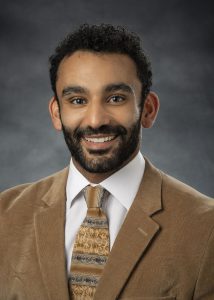
Matthew Soliman, a third-year medical student at the Boonshoft School of Medicine, is taking an innovative approach to produce a unique medical case report.
Many of us are keenly aware of the uncertainty artificial intelligence (AI) technology poses and the potential pitfalls it presents if used for nefarious purposes. But there is a lot of good that can come from a polarizing technology in its embryonic stages.
Matthew Soliman, a third-year medical student at the Wright State University Boonshoft School of Medicine, is teaming with several partners to produce a case report using AI technology that attempts to create different images portraying a gunshot wound injury in a pregnant woman.
“The goal of this case report would be to demonstrate that the actual hole that the bullet caused can be used as the starting point for the cesarean section and additionally push the current boundaries of how AI can be implemented into medical education and training,” said the Springboro High School graduate. “This case report would be used as an educational tool and would be one of the first of its kind in the AI imaging space.”
Soliman is working with Kinsloe Vela, an OB/GYN resident, who wished to use AI to re-create images of the patient. The 24-year-old woman sustained a gunshot wound to her abdomen at 35 weeks gestation. The medical team delivered the baby through the wound successfully.
“I have been coordinating the project and had the idea of using AI to help produce images but didn’t know how to go about that,” said Vela. “Matt has been very good at looking into things and working independently (on the case report).”
The pair is teaming on the project with Ghost Medical Animation, which specializes in AI-generated medical imaging.
The state-of-the-art 3D model will make complex medical scenarios more accessible and understandable, said Ghost Medical Animation spokesman Stephan Kuslich, adding that it will aid in teaching about gunshot wounds, emergency surgical procedures and the unique challenges of operating on a pregnant patient.
“We are excited about the potential impact of this 3D model on medical training and patient care,” said Kuslich. “This collaboration underscores the value of academic and industry partnership in advancing medical knowledge and improving patient care outcomes.”
Soliman, who was born in Boise, Idaho, to parents who immigrated from Egypt, moved to the Dayton area at the age of 5 and became interested in medicine through his participation in athletics.
He earned his bachelor’s degree in health sciences from the University of Cincinnati with an initial interest in working in sports medicine and physical therapy.
However, he decided to pursue a career in medicine and chose to attend medical school at Wright State because of its close-knit community and the hospital systems that work directly with the Boonshoft School of Medicine.
“I knew that would offer invaluable experiences during my third- and fourth-year rotations,” Soliman said. “I have enjoyed the different experiences Wright State has offered me such as getting involved as the social chair of the Latino Medical Student Association, participating in volunteer health clinics and amazing opportunities through Global Health like traveling to Iquitos, Peru.”
Although case studies are not part of the Boonshoft School of Medicine curriculum, Soliman said, they are something students can undertake with faculty to highlight learning opportunities from interesting or unique cases.
Always interested in AI, he jumped at the chance to work with Vela on a project to create an AI-generated image learning model of a case report to engage learners and push the boundaries of AI imaging for interactive learning.
“We will enhance learning by enabling medical students and professionals to explore the scenario from multiple perspectives, improving their grasp of the surgical approach and anatomical complexities,” Soliman said of the case report.
Soliman expects to graduate from the Boonshoft School of Medicine in 2026 after which he will participate in a residency program. He hopes to specialize in pediatrics.
“I’ve had multiple experiences where I was happiest working with kids of all ages, leading me to be very interested in pediatrics,” he said. “Although I loved my OB/GYN rotation and learned a lot of important skills and knowledge, I feel that working with kids is more my calling.”

 Wright State names Rajneesh Suri dean of Raj Soin College of Business
Wright State names Rajneesh Suri dean of Raj Soin College of Business  ‘Only in New York,’ born at Wright State
‘Only in New York,’ born at Wright State  Wright State president, Horizon League leaders welcome new commissioner
Wright State president, Horizon League leaders welcome new commissioner  Wright State celebrates homecoming with week-long block party
Wright State celebrates homecoming with week-long block party  Wright State baseball to take on Dayton Flyers at Day Air Ballpark April 15
Wright State baseball to take on Dayton Flyers at Day Air Ballpark April 15 